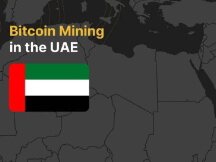Rising Uranium Prices Triggered by Tensions in Kazakhstan, Internet Shutdown Hits Bitcoin Mining
Recently, violence broke out in Kazakhstan. The unstable situation in Kazakhstan, the world's largest producer of uranium, which accounts for more than 40% of world production, has led to an increase in world uranium prices. At the same time, the world's second largest Bitcoin mall was disrupted by a network connection in Kazakhstan during a crisis.
As in "Saudi Arabia has problems with oil"
According to data from nuclear consultancy UxC (about 268 yuan), the price of uranium on January 5 fell from $ 42 per pound on January 4 to $ 45.25 per pound (about 289 yuan) on January 5, up almost 8.% from the previous month. days.
The conflict in Kazakhstan could lead to a global demand for uranium enrichment outside Kazakhstan, and uranium enrichment in North America and Australia could increase. However, according to a Reuters report from Jan. 7, the share of uranium producers in other regions rose for the 5th day, then fell for the 6th. Uranium X Exchange Traded Funds (ETFs) also lost 3.6%.
Jonathan Hinze, president of UxC, said the current situation "looks like Saudi Arabia is fighting oil," as Bloomberg reported on January 6.
The unrest in Kazakhstan pushed uranium prices up, but there was no uranium shortage or immediate shutdown of nuclear power plants. Unlike oil and gas power plants, nuclear power plants appear to have stored fuel for the past several years, so they can continue to operate even when shipped. The supply of fresh oil will be slow.
A spokesperson for the French multinational electric utility Orano SA said that KATCO, the uranium enrichment joint venture of Orano SA and the world's largest uranium producer Kazatomprom in Kazakhstan, is far from in conflict.
A spokesperson for the Kazakh Atomic Energy Industry Company said the uranium industry was "prospering as expected" and the company "completed the export contract."
However, as of January 6, the London stock of Kazakhstan was still down 6.7%.
Kazakhstan has been very careful with Bitcoin.
According to a report by the British Guardian of January 6, the Internet was cut off throughout Kazakhstan on the afternoon of January 5.
The hash rate, also known as the hash rate, refers to the speed at which miners explore the blockchain market and is an important indicator of the security of the Bitcoin network. From January 4 to 6, the hashrate of major cryptocurrency mining pools fell 14%. The value of bitcoin also fell, with the value of bitcoin falling below $ 43,000 (roughly 274,000 yuan) on January 6, the lowest level in several months. Earlier this month, the value of Bitcoin remained at $ 49,000 (around 313,000 yuan).
Kazakhstan is a "major player" in the Bitcoin arena and will become the second largest Bitcoin mining site in the world after the United States by 2021. According to data from Fortune, as of August 2021, Kazakhstan owns 18% of global bitcoin mining.
Creating or mining cryptocurrencies like Bitcoin requires high-performance computers that do the hardest part of the process, and the more miners there are on the network, the more computers need to mine for new Bitcoin. With high investments in coal and low electricity costs, Kazakhstan has become a popular destination for Bitcoin miners.
However, as the New York Times reported on January 6, Bitcoin mining has become a heavy burden on Kazakhstan's domestic power generation, and the government of Kazakhstan, which has started to accept Bitcoin, has done so. pay attention to the problem.

Scan QR code with WeChat































